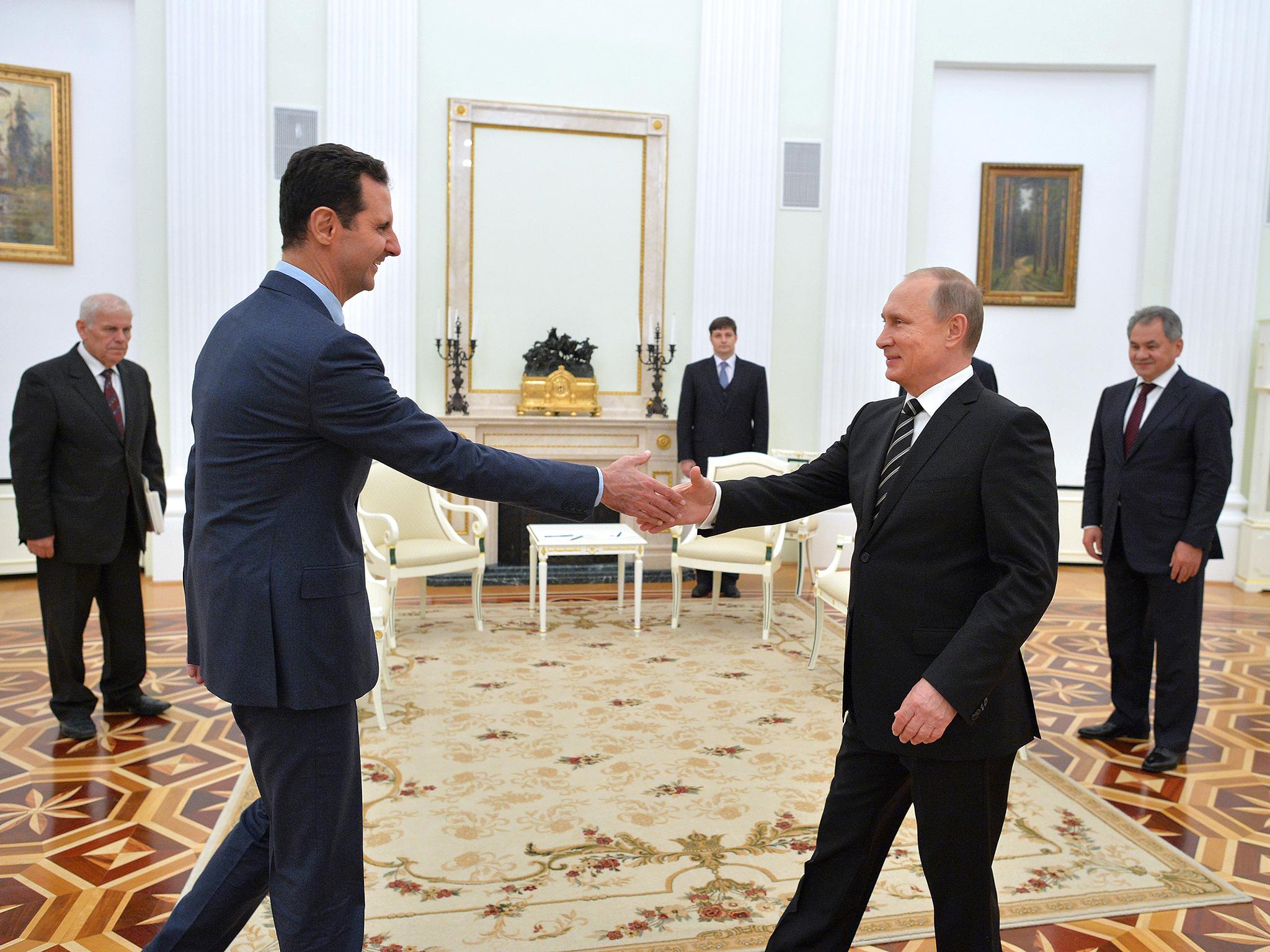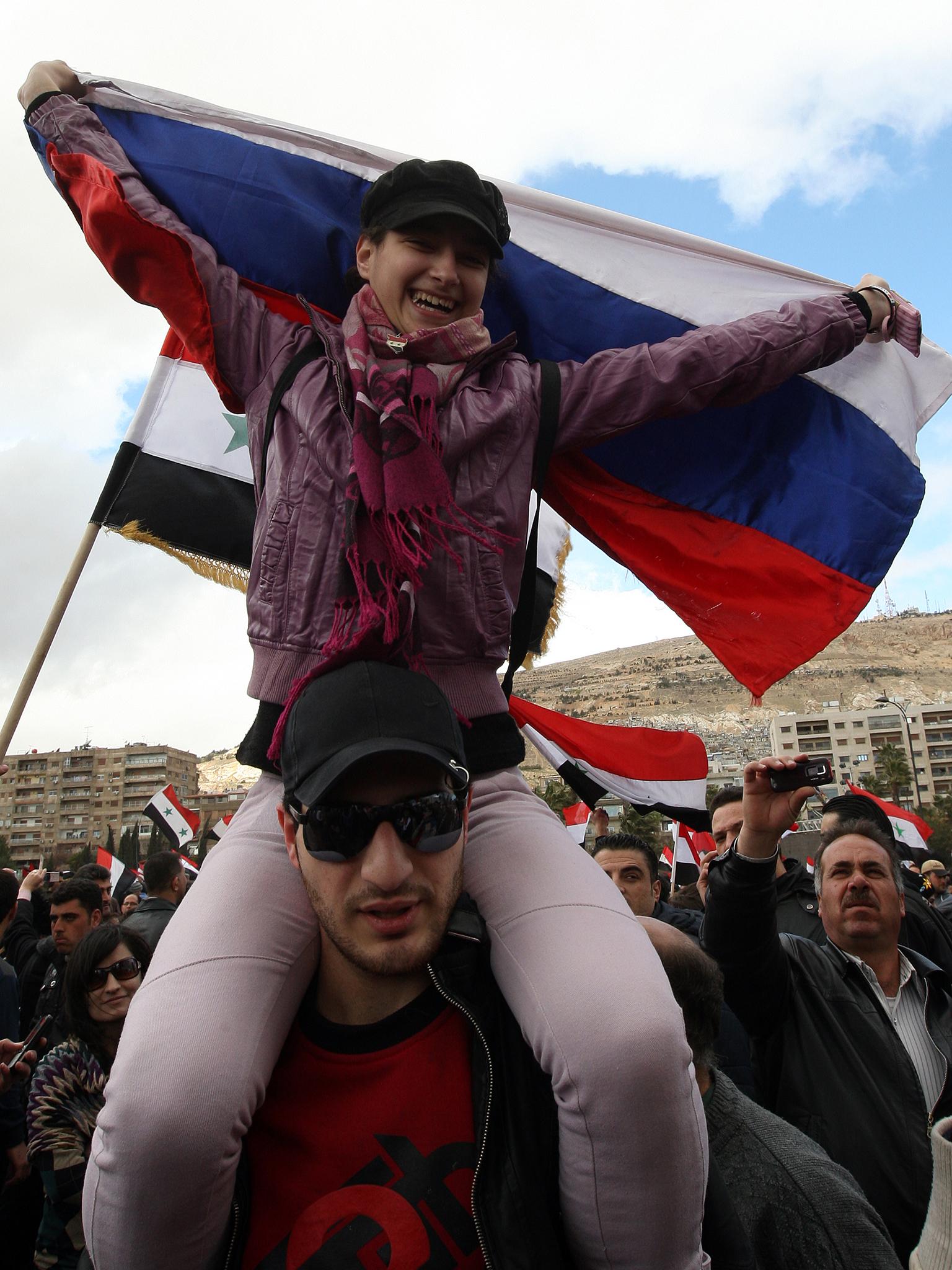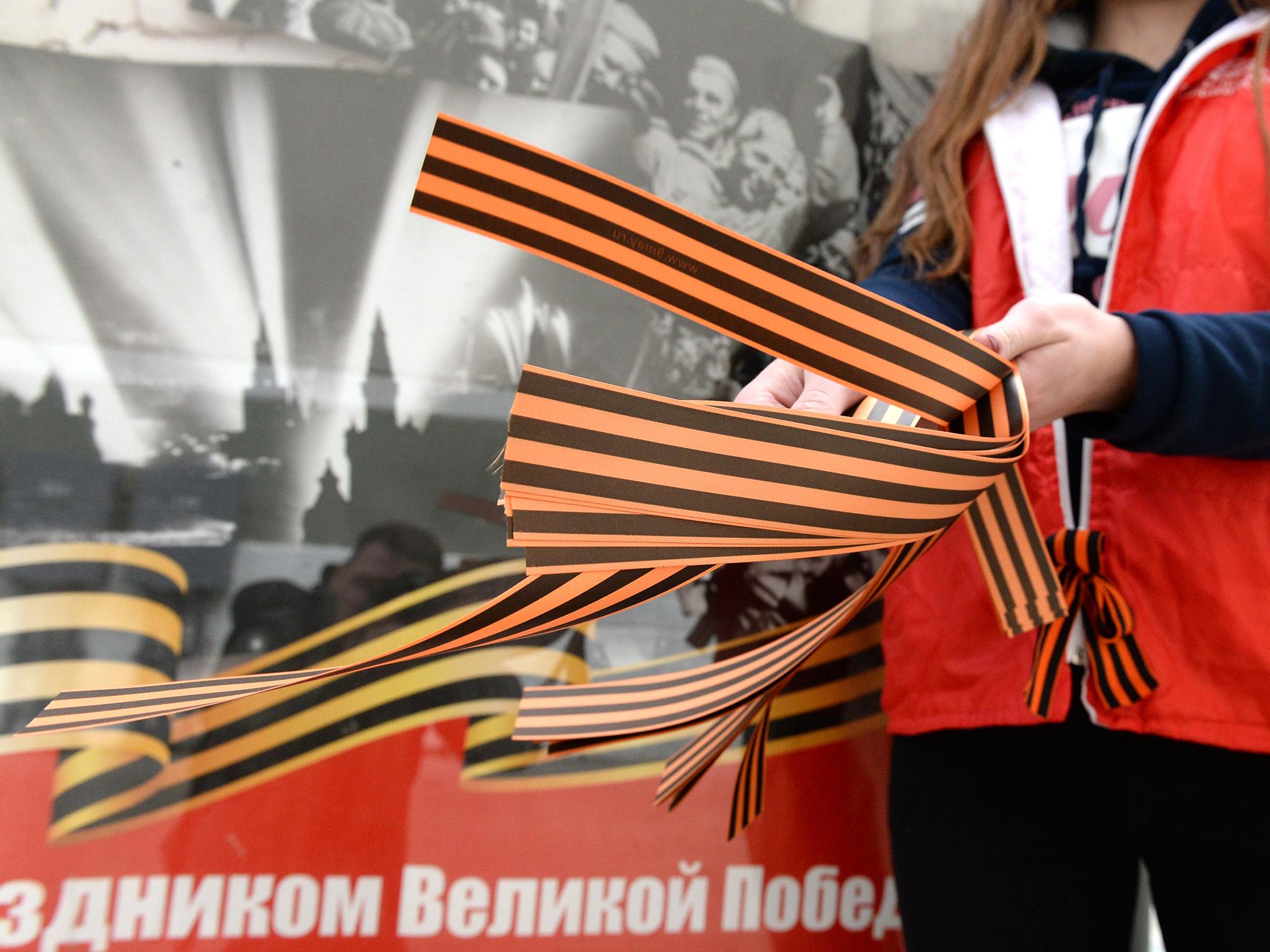Syria-Russia relations reach new high as Assad urges citizens to celebrate anniversary of Soviet triumph over Nazis
Relations between Syria and the Kremlin have never been better – and now even Damascus is festooned with ‘St George ribbons’ to mark the anniversary of the Soviet triumph over the Nazis

As the former Soviet Union rallies today to celebrate the defeat of Nazi Germany in the Second World War, there is an unlikely newcomer to recent Victory Day celebrations: Syria.
Seventy-two years after the end of Second World War, the top brass of Russia’s leadership descends on Red Square for the iconic military showcasing of Russia’s latest weaponry and military might, including nuclear weapons and airforce displays.
Last year, a similar Victory Day showcase of Russian and Syrian military was on display in the Syrian city Latakia on the Mediterranean, where a Russian military base has coordinated Moscow’s intervention in the Syrian civil war. This year, the unlikely commemoration of Victory Day in Syria has been bolstered by a Russian media campaign targeting cities throughout the embattled country.
“9 May is no ordinary holiday,” says Theodore Karasik, senior advisor for Gulf State Analytics, a Washington-based think tank. “The Soviet victory over the Nazis sealed the fate of the world at immense human cost, especially for Russia. Russia today uses Victory Day to inspire patriotism and showcase its ties with allies.”
“For Russia, Islamic terrorism is yesterday's fascism and Moscow's support for Syrian President Assad is seen as necessary through Kremlin lenses.” By promoting Victory Day in Syria, says Karasik, “Russia is also showing its prowess in today's Middle East.”
The Syrian civil war, which began in 2011 as a series of non-violent demonstrations against President Bashar al-Assad, has cost nearly half a million lives and displaced half the nation’s population. The entrenched conflict has become a proxy battleground for Middle East rivals and Western nations.

Russia’s intervention in the Syrian conflict, “rescued the Syrian regime and helped it crush the opposition,” says Michael Kofman, a security analyst at the Centre for Naval Analyses and a fellow at the Wilson Centre.
“After reversing the Turkey and US policy for President Assad’s ousting, eliminating would-be alternatives to the current regime, and capturing most of the population centres, Russia is well placed to dictate terms for post-conflict settlement.”
With military hardware lining the streets of St. Petersburg and Moscow and jets thundering overhead in preparation for Victory Day, Russia launched the “St. George ribbon” campaign in Syria to raise awareness of Russia’s victory over Nazi Germany 72 years ago.

Pictures from Damascus University showing students distributing the St. George ribbon, a symbol of the Russian military, circulated on social media in the days leading up to 9 May. The black-and-orange striped ribbons were accompanied with explanations of the celebration in Arabic.
“From here the action will start all over Syria," said Major General Gennady Ryzhov, head of the Damascus Centre of the Reconciliation Centre in Syria which coordinated the distribution with the students.
“You have a symbol of victory over fascism – we want to have a symbol of victory over terrorism,” the head of the Russian language department at Damascus University, Mamduh Abu-al-Luway, recently told Russian-state media.
But Alexey Kovalev, a Russian media analyst and curator of the fake-news debunking site the Noodle Remover, says Syria was, “completely irrelevant to the Russian war effort during the Second World War. Moreover, Bashar al-Assad's father, Hafez al-Assad, famously harboured Nazi criminals such as Alois Brunner – a fact that modern Russian propaganda conveniently forgot”.
“The fact of Syrians wearing the St. George ribbons today is politically symbolic, but historically irrelevant.” Kovalev says. “It is Syria’s ‘rite of initiation’ into Russia’s sphere of influence and evidence that Assad will do anything for continued Russian political and military support.”
Ekaterina Schulmann, a Russian political scientist, says Victory Day symbolism and anti-fascist rhetoric were over-exploited in Russia following 2014's events in Ukraine. It reached its peak in 2015 and has been on the decline since. “It’s impossible not to notice fewer ribbons this year and a more subdued tone to the celebrations.”
Schulmann says the appearance of the ribbons in Syria is not to reinvigorate deflated celebrations at home, but rather to demonstrate that is it “the Ministry of Defense who is in charge in Syria,” and potentially “an effort to connect Russia’s activities in Syria with the war against fascism”.

In Aleppo, where notorious battalions of Russian special forces were deployed last year to “keep peace and public order,” banners of Russian President Vladimir Putin hang alongside posters Bashar al-Assad and his most loyal allies: Iran’s Supreme Leader and the head of the Lebanese Islamist group Hezbollah Hassan Nasrallah.
Russian state media aired a report from Aleppo this month showing a choir of Syrian children enthusiastically singing the famous Victory Day song ahead of the 9 May commemorations. “Of course, these children know this song as well.” Russia’s Channel One presenter says. “The meaning of this song is known to everyone in Aleppo now.”
“Russian state media obligingly portrays Assad as a maligned leader besieged on all sides by the scheming West and bloodthirsty jihadis, with only Russia by his side,” Kovalev told The Independent. “The purpose of showing Syrian children singing the Victory Day song is to show Russians at home their country is winning hearts and minds around the globe.”
Moscow’s efforts to enforce a ceasefire and bring about a political resolution to the conflict in Syria have been mired in accusations it purposefully targeted aid convoys and civilian infrastructure, including mosques and hospitals, during its campaign. Russia has recently come under fire for blocking an investigation at the UN into a chemical weapons attack on civilians in Khan Sheikhoun in North-western Syria on 4 April.
Syrian regime officials recently announced Russian had become the nation's’ second language, and would be taught in schools. “The decision of Assad that Russian should be the second language in the country – it is a sign of the gratitude towards the Russian people for supporting Syrians,” the ambassador of Syria to Russia, Riyad Haddad said.
The ambassador added, "It is no secret if I say that the children of the president [Assad] are now learning Russian. Also, as a sign of this gratitude, many families are also calling their sons Putin,” he said.
Join our commenting forum
Join thought-provoking conversations, follow other Independent readers and see their replies
Comments
Bookmark popover
Removed from bookmarks